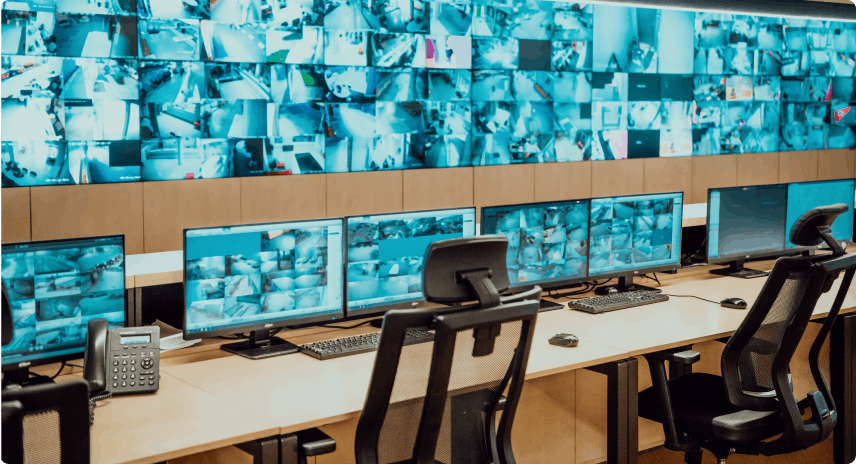
- Integrated Security Solutions
- Physical security
The future of alarm panels in the physical security industry
In an ever-evolving world of technology, the physical security industry is no exception to innovation and advancement. One crucial component of this industry that has seen significant transformation over the years is alarm panels. These panels have come a long way, from humble beginnings to becoming integral to modern security systems. In this article, we'll explore the evolution of alarm panels, examine the current state of security systems, and dive into the future of alarm panels, particularly focusing on the need for recurring revenues.
A brief history of alarm panels
At the dawn of the new millennium, digital technology entered the security industry, forever changing the landscape of security systems. The adoption of digital recording revolutionized video surveillance, leading to a remarkable enhancement in image quality and recording speed.
In those early days, security technology revolved around embedded, dedicated hardware. However, as the consumer world surged with technological innovations, these advances inevitably spilled over into security, bringing new capabilities and functionalities. As consumer technology continued to advance, many of these innovations entered the video surveillance market.
And the evolution did not stop at digital recording. The rise of the mobile phone market ushered in image sensor technology and vastly improved communication networks. Simultaneously, the gaming industry introduced fast, efficient, online central processing capabilities. Further advancements in silicon designed for computing paved the way for running artificial intelligence (AI) with remarkable efficiency. Cloud-based technology also expanded storage options, providing users more flexibility for storing valuable footage.
Connectivity witnessed a profound transformation over the years. As we reflect on the evolution of alarm transmission speed, security professionals designed products around ISDN and PSTN network dial-up. ISDN was considered high-speed, as broadband had yet to appear. Everything operated on leased lines, and observing how far we've come regarding speed, reliability, and mobility is fascinating.
However, the acceleration of technology's progress was not solely due to enhanced speed and efficiency. Improved accessibility played an equally vital role. Organizations in the 1990s and early 2000s required substantial in-house IT departments with experts to manage their technology. Yet, the advent of cloud computing marked a transformative shift. The cloud democratized access to powerful technology, making it available at a fraction of the cost and on demand. This democratization of technology marked a significant turning point for the industry.

The current state of security systems
With technology continually evolving, the present-day security landscape continues to undergo significant changes, paving the way for innovative security solutions. Technology, especially various artificial intelligence (AI) forms, has played a critical role in reducing false alarms and enhancing overall security. Today, the challenge goes beyond false alarms in today's security landscape. As technology continues introducing new tools and capabilities, processing vast data has become a central concern. We must note the value of data in contemporary businesses while acknowledging the burden of data overload. The solution is not to reduce the volume of data but rather to leverage AI to identify patterns within the data, presenting relevant information to the right individuals at precisely the right time. This approach improves decision-making and adds value across all operational levels.
In summary, the present security landscape is marked by the ongoing evolution of technology, which has given rise to innovative security solutions and a renewed emphasis on data processing and analysis. As technology advances, the security industry is better equipped to provide businesses and individuals with more efficient and effective security solutions.

The future of alarm panels: Not just alarms, but recurring revenues
Let's gaze toward the security industry's future, which promises continued transformation and innovation: What lies ahead?
The security industry has historically moved at a measured pace. Security systems are often integrated into buildings and expected to stand for many years. However, as real estate eventually requires upgrades and new buildings emerge, the digitization of security systems is poised to take center stage.
It’s natural to envision a future where buildings come equipped with pre-fabricated security technologies, seamlessly digitizing and harmonizing all data generated by these systems. Collaboration within the industry will become increasingly vital to advance in this direction, setting standards for cybersecurity and embracing cloud technology. As security systems become less reliant on traditional hardware, they must communicate and share data seamlessly. Consequently, there will be a pronounced shift toward cloud-based technologies, especially as AI plays a central role in interpreting data and uncovering patterns.
The future of security technology also emphasizes that hardware will continue to be a significant component of security solutions. Security specialists will remain essential for fitting and installing hardware to ensure optimal functionality. However, the emphasis is expected to shift from hardware sales to providing software and services. The data generated by hardware and the business intelligence it provides will become increasingly vital for end-users. With the industry's transition to a service and software-centric model, subscription-based security solutions are poised to take center stage.

This perspective indicates that the subscription model will likely dominate the future as security firms venture further into software-as-a-service. Departing from traditional hardware-focused profit models, the industry will pivot towards subscription-based, value-added approaches. These approaches promise to deliver better services to end-users while proving more profitable in the long run.
Many security businesses have successfully adopted a subscription-based model in recent years, yielding positive results. They envision a future where equipment becomes smaller, faster, and more cost-effective. AI will continue to play a substantial role, leveraging AI to enhance security solutions further.
In conclusion, the future of the security industry promises ongoing transformation and innovation. With the digitization of security systems, the embrace of cloud technology, and the adoption of subscription-based models, the industry is poised to offer more efficient and effective security solutions, benefiting businesses and individuals alike.


